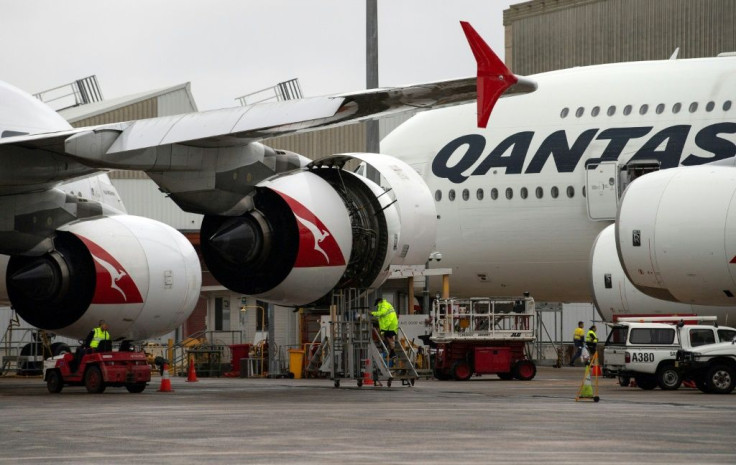Qantas To Cut At Least 6,000 Jobs, Embarks On Three-Year Cost Savings Plan

KEY POINTS
- The job cuts will impact at least 1,050 cabin crew and at least 220 pilots
- The job cuts and other measures are designed to save the airline $15 billion over the next three years
- Joyce estimated that domestic demand for air travel will fully recover by 2022
Australia’s largest carrier Qantas Airways plans to cut at least 6,000 jobs across all parts of its business as the covid-19 pandemic has grounded almost all of its operations and devastated revenues.
The job cull represents about one-fifth the airline's workforce prior to the pandemic. In March, the airline furloughed two-thirds of its staff.
The planned job cuts will impact about 1,500 people in ground operations including baggage handlers, at least 1,050 cabin crew and at least 220 pilots.
Last week, the Australian government said its borders will likely remain closed into next year. Qantas has canceled all international flights except for travel to neighboring New Zealand.
On Thursday, Qantas chief executive Alan Joyce said the airline expects to generate lower revenues over the next three years. He emphasized the covid-19 crisis has hit Qantas "very hard" and that "the impact will be felt for a long time.”
"Right now all airlines are in the middle of the biggest crisis our industry has ever faced," he said. “Airline revenues have collapsed, entire fleets have been grounded. And the world's biggest carriers are taking extreme action just to survive.”
Joyce added: “The actions we must take will have a huge impact on thousands of our people. But the collapse in billions of dollars in revenue leaves us little choice if we are to save as many jobs as possible, long term."
The job cuts and other measures are designed to save the airline $15 billion over the next three years, and then result in ongoing cost savings of $1 billion annually starting in the 2023 financial year.
Joyce estimated that domestic demand for air travel will fully recover by 2022, but that by that time international demand will only be about half of levels from prior to the crisis.
He noted the airline plans to return to 40% of its pre-crisis domestic flights beginning in July, and "hopefully more in the months that follow.”
Joyce added that Qantas, and its low-cost subsidiary carrier Jetstar, will extend a furlough for about 15,000 workers "as we wait for the recovery we know is coming.” The furlough primarily involves workers in the airline’s international operations.
Joyce further said Qantas was having "good discussions" with the Australian Federal Government about extending JobKeeper – a wage subsidy program for furloughed workers.
"We're also in dialogue with state and territory governments about their border openings because, once that happens, we can get more of our people back to work," Joyce added.
Qantas also said about 100 of its aircraft will be grounded for up to 12 months – some will be shelved even longer. The airline will permanently retire its remaining six Boeing 747 aircraft six months early and defer purchases of new Airbus A321neo and Boeing 787-9 aircraft.
“We’ve never experienced anything like this before, no one has,” Joyce said. “We’re facing a sudden reversal of fortune that is no one’s fault. That is very hard to accept… We have to position ourselves for several years where revenue will be much lower. And that means becoming a smaller airline in the short term. Most airlines will have to restructure in order to survive, which also means they’ll come through this leaner and more competitive.”
Unions have condemned the job cuts.
The national secretary of the Transport Workers Union, Michael Kaine, said Qantas should have delayed the layoffs until its talks with the federal government on extending the Jobkeeper program had concluded.
“Before Qantas slashed thousands of workers’ jobs and takes more of its planes down to the pawn shop it should be lobbying the federal government for an extension to Jobkeeper and financial support to allow the airline to weather the crisis,” he said.
Kaine also blamed the government for refusing to bail out the aviation industry.
“The Qantas CEO is very good at walking the halls of [Australia’s seat of government] Canberra when it suits his agenda, yet he is quick to cut jobs and hang workers out to dry. We are demanding that he halt these redundancies until the federal government makes an announcement on jobkeeper.”
Separately, Qantas plans to raise about $1.3 billion in equity from investors in order to attract new funds and help "accelerate" its recovery.
Joyce noted this will be the company's first equity raising in ten years "and once we have recovered, this capital will help us take advantage of opportunities that emerge.”
The capital raising will comprise an institutional placement of $940 million and a share purchase plan for shareholders of up to $344 million.
Joyce has agreed to stay on as CEO until at least the end of the 2023 financial year while the three-year recovery plan is implemented.
© Copyright IBTimes 2024. All rights reserved.



















